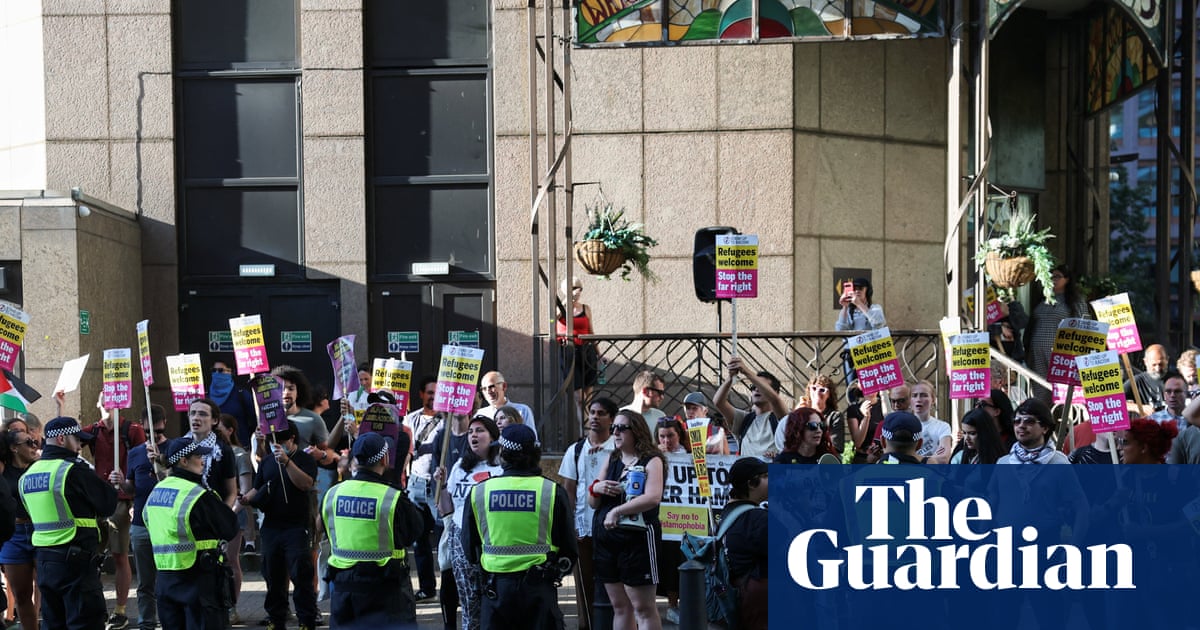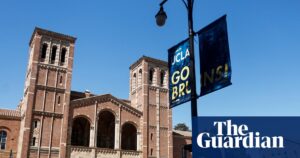
Three thousand riot officers will be deployed and placed on standby amid concerns a string of anti-asylum seeker protests and counter-protests this weekend could lead to violence and disorder.
Police commanders at a national level have made the decision. It is the first time since last summer’s riots that there has been a mass and national standing up of specialist public order officers.
Some of the extra riot officers will be deployed on the streets, kitted out in helmets and shields to act as a deterrent. Others will be held in reserve and all will be on standby to be rushed across England and Wales to “hotspots” of violence and rising tension, a police source with knowledge of the planning for this weekend said.
The same source stressed there was no specific intelligence of violence, but 800 extra riot officers were ordered to be made ready on Friday, on top of the 2,200 planned already.
At least 20 protests targeting hotels used by the government to house asylum seekers are thought possible this weekend, with each one in turn potentially attracting a counter-protest.
One senior officer in an area expecting protest said: “It is impossible to tell what you are going to get.
“Within crowds you can get different factions, concerned locals, bystanders, extremists.”
Officers will need to keep both sides apart as well as ensure disruption is kept to a minimum for the vast majority of people in the areas affected.
The 3,000 riot officers have been requested from local forces and will be directed by the National Police Operations Centre.
Local commanders will make decisions about specific deployments. In some areas public order officers may deploy in full riot gear from the start to act as a deterrent, other forces will prefer to have officers in regular uniforms, so called “soft hats”, to start with, with fully kitted riot officers in reserve and close by if trouble erupts.
The far right is pushing some if not most of the protest but those attending are expected to also include local people left concerned by claims linking asylum seeker hotels to serious crime.
Police public order resources this weekend face a pincer movement from right and left.
The Metropolitan police, which covers Britain’s protest capital of London, is calling in support from other forces as it faces three days of substantial public order challenges.
It thinks it unlikely many will turn out to an anti-migrant protest in Islington, north London, on Friday night, more are expected at another in Canary Wharf on Sunday.
On Saturday in central London there is a pro-Palestine march, as well as a protest where those who support Palestine Action or oppose the ban on it under terrorism laws, are being encouraged to dare police to arrest them.
Organisers and police sources agree privately hundreds are likely to turn up, the range likely to be 200 to just under 1,000, encouraged to hold placards containing the words “I support Palestine action”, which police say will lead to arrest.
Organisers hope to stretch to breaking point the police and criminal justice system’s ability to deal with a mass defiance. Police believe they will manage unless the numbers exceed expectations.
In London, small groups of protesters started to gather from about 5pm on Friday across the road from the Britannia International hotel in Canary Wharf. Riot police scrambled to keep groups of masked men who broke away from the anti-asylum seeker protest from reaching a separte group of anti-racism activists who had attempted to walk down to the Britannia hotel from Heron Quay DLR station behind a banner.
About 200 anti-migrant protesters – including men waving St George’s flags and an Israeli flag some of whom were supporters of the far-right activist known as Tommy Robinson – had gathered across the road from the hotel, with some hurling abuse at a Stand Up to Racism protest of about 100 activists, trade unionists and others.
Police kept a distance but vans with public order officers were also stationed in streets nearby.
On Sunday in London, there will be a march in support of the release of hostages taken from Israel by Hamas in the 7 October 2023 attack, as well as football’s Community Shield match, with that and the start of football’s lower divisions this weekend further requiring police public order resources.
Metropolitan police deputy assistant commissioner Ade Adelekan, who will lead the policing operation, warned people who want to protest against the banning of Palestine Action that they should expect a terrorism charge: “What sets this protest apart from others is participants are coming out not just to express a view, but with the aim of being arrested in very large numbers to place a strain on the police and the wider criminal justice system.
“We will have the resources and processes in place to respond to any eventuality.
“Anyone showing support for Palestine Action can expect to be arrested. I would once again urge people to consider the seriousness of that outcome. An arrest under the Terrorism Act can have very real long-term implications – from travel, to employment, to finances. Also, as we have seen this week, it is very likely an arrest in these circumstances will lead to a charge.”
There was some unease in Nuneaton on Friday afternoon, before what is expected to be a big turnout at a protest outside the council building on Saturday.
The Warwickshire town has become a target for far-right activists in recent days, after two Afghan men were arrested on suspicion of kidnapping and raping a 12-year-old girl. They have now been charged in relation to the alleged incident.
The Reform UK council leader, 19-year-old George Finch, accused the police of covering up the claim that the men, Ahmad Mulakhil and Mohammad Kabir, are asylum seekers.
On social media, local people and far-right agitators expressed anger that the town was a home for asylum seekers, with Facebook groups popping up including “Nuneaton says No!”, which was created by Tom Huburn-King, a founding member and regional organiser for the far-right Homeland party.
A group of retired women sitting outside a cafe said they supported the protest. “I think it’s good … They’re only protecting the children. That’s all they’re doing,” said one woman, who had lived in Nuneaton all her life and would not give her name because “you can’t have an opinion because you’ll get locked up”.
She said: “I don’t really take a lot of notice but when the children start getting raped, there’s a limit.”
Warwickshire’s police chief constable, Alex Franklin-Smith, took the unusual step of publishing a letter to Finch on Wednesday, writing that the police had asked the Home Office to confirm the immigration status of the two men accused in connection with the alleged rape, and “did not and will not cover up such criminality”.
Care workers Chijioke “CJ” Ani and Musa Samson, both originally from Nigeria, had also heard about the protest. Were they concerned about it? “Of course I am, because you don’t know what will come out of it,” Ani said, adding that he would go to work and go home and not stay in the town on Saturday. He said he had seen a lot of anti-immigration sentiment on social media. “Some of them are misinformed or acting out of impulse,” he said. “It makes me feel like someone will attack me some day, if I’m walking down the road. It’s definitely getting worse because the far right are getting stronger.”
While the men, originally from Nigeria, had found Nuneaton to be a friendly town, they had initially been worried about their safety, arriving from London to a whiter area, “but I’m used to it now”, Ani said. Samson said he had experienced some racism, with men making noises at him as he approached a local bar. “It’s one of those things,” he said.
Most people the Guardian spoke to in Nuneaton said they would be avoiding the town centre, with many saying they did not agree with the protesters, though they thought people should be able to protest.
Lawrence McIntyre was serving teas and coffees from The Kiosk in the centre of the town. He was worried nobody would go into the town centre on Saturday and that he would have no customers.
“I do feel sorry if it does put people off coming down shopping. The market traders and the small businesses, they rely on [customers].”
He said there had been plenty of diversity in the town for a long time and it had not been a problem until now.
“There’s good and bad everywhere, not just in Nuneaton, wherever you are.”








